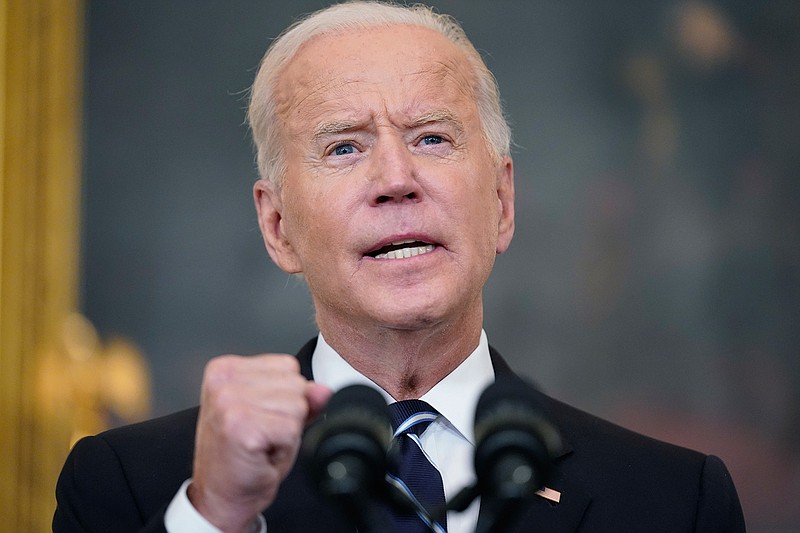The U.S. may not have enough tests to keep pace with the Biden administration's tightened workplace COVID-19 mitigation measures.
Under regulation expected in the coming weeks, companies with 100 or more employees will need to require that workers get vaccinated or undergo weekly testing. That could represent nearly double the volume of tests currently being processed, and may make already hard-to-find rapid tests more scarce and lengthen wait times in lines and for results.
"We're going to get logjammed," said Michael Mina, an epidemiologist with the Harvard T.H. Chan School of Public Health. "We're going to have major problems. We're not going to have the production capacity."
Some 81 million Americans worked at firms with 100 or more employees as of early 2020, according to the U.S. Bureau of Labor Statistics. If about a quarter of that population remains unvaccinated, as many as 20 million individuals could require weekly screenings - a rate of nearly 3 million tests per day. By contrast, about 10 million Americans were tested each week, on average, over the last month, data compiled by Bloomberg show.
The Biden administration announced last week that the Department of Labor's Occupational Safety and Health Administration would soon implement the emergency regulation, and those who do not comply could face fines of up to $14,000 for each violation. It also earmarked $2 billion for 280 million rapid tests for use in community sites like schools and food banks, and said the Defense Production Act will be used to build out testing manufacturing capabilities.
"Right now, there's simply not enough tests available to do the testing that's being called for," said Jennifer Nuzzo, lead epidemiologist for the Johns Hopkins University's COVID-19 testing insights initiative.
Part of the problem is that test manufacturers haven't kept up with a recent jump in demand.
In the spring and early summer months, demand for tests waned as vaccinations took off and COVID-19 appeared to be retreating in the U.S. But between the delta surge and reopenings of workplaces and schools, testing volume is increasing again.
The Biden administration's move is part of a broader attempt to get to vaccine holdouts, and an official said the weekly tests are a key mitigation step for those staffers who aren't fully immunized. For companies with concerns about weekly testing for employees, the easy solution is to get staff inoculated, the official said.
White House Press Secretary Jen Psaki said at a Friday briefing that the administration has made efforts to meet increased testing demand, and pointed to the recent investments, including the rapid test purchase and earlier funding for school and community testing in the American Rescue Plan.
"Testing is also a component that probably we don't talk about enough, or the world doesn't talk about enough - because it is important, and it's a way to make sure people have - are protected," Psaki said. "We know the demand for rapid tests has more than doubled in recent weeks, and so we're also being responsive to that."
While the Biden administration may be hoping to bring more testing companies to the table, "the question I have is: How long is that going to take?" said Nuzzo. "We need them now."
What testing experts fear could happen is already playing out in Alaska, where many of the state's larger employers like the federal government and the oil, gas and fishing industries, already require either vaccination or testing. Between those policies and a surge in Covid-19 cases, "we're getting hit doubly right now," said Coleman Cutchins, the state's Covid testing lead.
"When you pull up to a drive-through testing site and it's a three-hour line, people are not waiting in that line," he said.
It's difficult to predict the potential testing strain because current data do not account for at-home tests sold without a prescription, among others. It's also unclear what future demand may look like and how much the administration's investment in rapid testing will expand capacity.
Harvard's Mina estimates that as much as two or three times as much testing may be going on than officially accounted for. And while the 280 million rapid tests being purchased by the government sounds like a large figure, it translates to "less than one test per person, per year" across the U.S. population, he said.
Ramping up the manufacturing of rapid testing products would help satiate growing demand, Mina said. Part of what the administration's purchase of those tests could do is signal to manufacturers that there is a longer-term market for virus screenings.
Rapid testing supply is already strained, with schools unable to get all of what they need, said Mara Aspinall, who leads the K-12 National Testing Action Program, a consortium of testing companies working to help schools perform screenings.
"We are at a precarious balance right now," she said. "We need to see a significant bump in supply in the very short term."
Specifics of the Biden plan, like what kinds of screenings can be used and who will pay for the tests, also haven't yet been disclosed. They will be addressed in rule-making, the official said.

